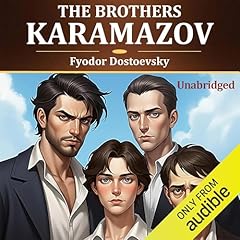![The Brothers Karamazov [Naxos AudioBooks Edition] Audiolibro Por Constance Garnett - translator, Fyodor Dostoevsky arte de portada](https://m.media-amazon.com/images/I/51DpA-g11JL._SL500_.jpg)
The Brothers Karamazov [Naxos AudioBooks Edition]
No se pudo agregar al carrito
Add to Cart failed.
Error al Agregar a Lista de Deseos.
Error al eliminar de la lista de deseos.
Error al añadir a tu biblioteca
Error al seguir el podcast
Error al dejar de seguir el podcast
 Exclusivo para miembros Prime: ¿Nuevo en Audible? Obtén 2 audiolibros gratis con tu prueba.
Exclusivo para miembros Prime: ¿Nuevo en Audible? Obtén 2 audiolibros gratis con tu prueba.Compra ahora por $31.58
-
Narrado por:
-
Constantine Gregory
Fyodor Dostoyevsky is a titanic figure among the world's great authors, and The Brothers Karamazov is often hailed as his finest novel. A masterpiece on many levels, it transcends the boundaries of a gripping murder mystery to become a moving account of the battle between love and hate, faith and despair, compassion and cruelty, good and evil.
Download the accompanying reference guide. Public Domain (P)2013 Naxos AudioBooksLos oyentes también disfrutaron:




















Featured Article: Essential Russian Authors to Know in Audio
Don’t be daunted by the towering reputations of Russia’s literary giants. Listening is the perfect way to appreciate the masters. Russia is a sprawling country with a rich and complex history, which is reflected in its literature. Whether you’re keen on brushing up on classic Russian literature or you want to find a new author to explore, we’ve rounded up 13 of the best Russian authors, classic and contemporary, whose work you should know.
Las personas que vieron esto también vieron:


















Gregory gives a rather calm and relaxed rendering of the work, which is nice in the long run.
My dream "audio" Karamazov would be David Horovitch narrating the Pevear and Volokhonsky’s translation.
However as it stands now, this version by Constantine Gregory is the best "Karamazov" available.
Best "Karamazov" yet.
Se ha producido un error. Vuelve a intentarlo dentro de unos minutos.
great reader
Se ha producido un error. Vuelve a intentarlo dentro de unos minutos.
Philosophy, Religion and Romance
Se ha producido un error. Vuelve a intentarlo dentro de unos minutos.
The narrator (performance) only got 4 stars rather than 5 because, though he did a very good job, I've heard better, and at times I felt that there was not enough distinction among the various characters' voices (including the narrator's voice). From the context you could tell who is talking, but not always from the distinct voice.
I read about the various translations of this book. Though there is negative (and positive) critique of Constance Garnett's translation and many people prefer one of the newer translations (many say Richard Pevear and Larissa Volokhonsk), without me having a side-by-side (or multi-column) set of versions, and, more important, without me being able to understand the Russian, I can't evaluate the translation that was used. But I didn't find anything particularly strange or out of place. In fact, because she referred to children as "kids" and "kiddies", I thought it sounded almost too contemporary, but maybe those terms were a good equivalent for the Russian. If you are looking for an audiobook version - and I find this a great pleasure to be read to - I don't think the translation should stand in your way.
I would like to comment about Dostoyevsky’s numerous references to Jews. I love 19th century literature, and I’m used to the pawnbroker, always being referred to as “the Jew” (a negative stereotype, of course – why not just say “a pawnbroker”?), the usurer, and other negative stereotypes. They are always troubling, but I accept it as part of the period, the attitudes of the period, and hope that intelligent readers (are there any other kind?) recognize these references as problematic symptoms of a period in history, as are derogatory references to other persecuted minority groups in what is otherwise great literature. In the case of The Brothers Karamazov, I found these references to be more prevalent than in other works, even of the same author. Particularly troubling is the question put to Alyosha about whether Jews kill a (presumably Christian) child at Easter, and his response “I don’t know”. Perhaps it could be said that Dostoyevsky is representing a character – a former monk who is ignorant of Judaism, which, of course, is totally realistic. Yes, even though that former monk is supposed to represent the conscience and charity of Christianity, that representation is laid bare – Christian love only goes so far. Learning other religions in theology school was not yet in vogue, and ecumenical conferences far from existence. But if Dostoyevsky does not believe this himself, one would hope he’d understand the danger of perpetuating such ideas. Books have been written about Dostoyevsky’s attitudes towards Jews, and literature scholars have various opinions about what the author himself actually thought. I wrote about this matter because any reader of Dostoyevsky should not take these expressions lightly, but should consider them and their impact in cultures, just as a reader should examine any bigotry expressed in literature and other arts.
Brilliant book, a pleasure to have it read to me
Se ha producido un error. Vuelve a intentarlo dentro de unos minutos.
An absolute classic for the bookworm
Se ha producido un error. Vuelve a intentarlo dentro de unos minutos.



